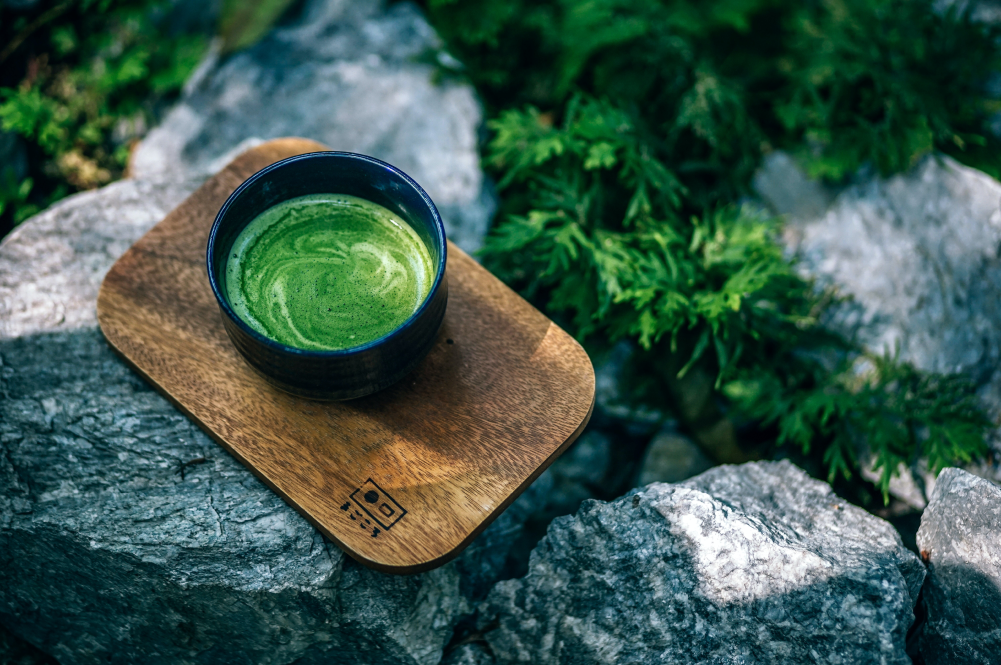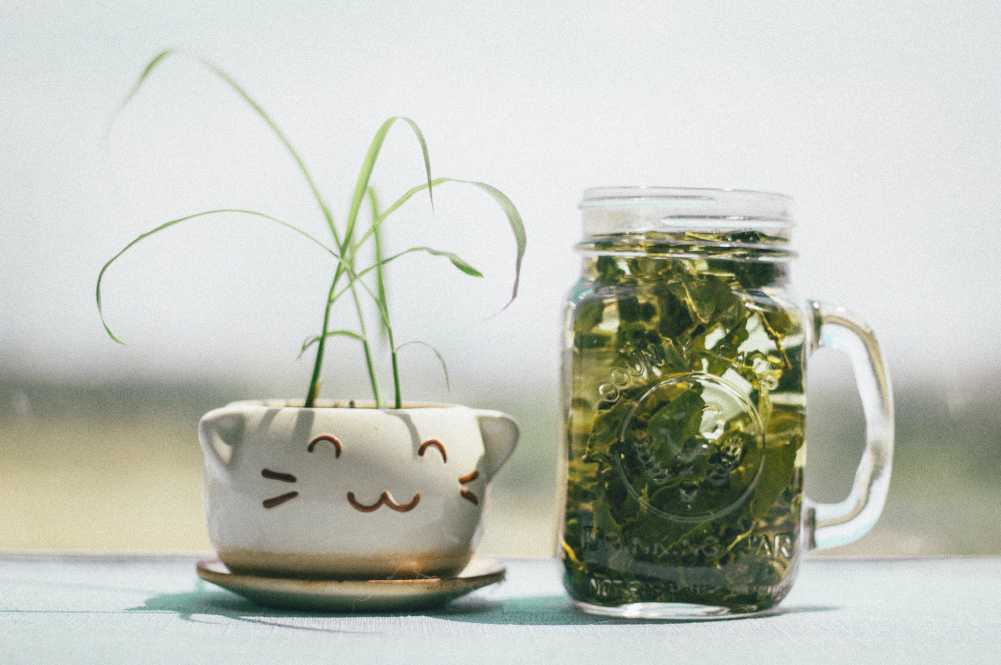Just after water, tea is the 2nd most consumed beverage in the world, and with all its health benefits and charm, it's number 2 for a reason. 1/4th of the global sales of teas include green and herbal teas, which is the subject of this blog today.

Drinking green tea is a great way to bridge the gap between drinking plain water and grabbing something with flavor, but did you know it could also help make your trips to the bathroom more regular?
That's right - there are several digestive benefits linked to enjoying this popular beverage, and we’re here to talk about all of them, one by one.
Though, to explain shortly, consuming green tea can greatly make you poop if you’re experiencing constipation, due to the presence of caffeine which has a laxative-like effect.
So make sure to read till the end, and find out how, and why, green tea might be just what you need to get things moving in more ways than one - from an energy boost during your day, all the way through regular visits to the loo!
Table of Contents
- Constipation - Common Culprits Behind It
- Green Tea and Constipation - What Research Says
- Potential Health Benefits Of Drinking Green Tea
- Are There Any Downsides To Drinking Green Tea?
- Does Green Tea Make You Poop?
- How Much Green Tea Should You Be Drinking
- Alternatives To Green Tea For Pooping
- Bottom Line
Constipation - Common Culprits Behind It
Ah constipation, the age-old enemy of a good bowel movement.
Technically speaking, constipation is when a person has less than three bowel movements in a week or has hard, dry, and difficult-to-pass stools.
But let's be real, we all know what it feels like to get blocked up down there.
The reasons for constipation can vary from lack of fiber in one's diet, to not drinking enough water, to even being on certain medications like painkillers.
Stressful and sedentary lifestyles can also lead to constipation, as we tend to hold our breath or clench our muscles when under tension.
Whatever the cause, the discomfort and inconvenience that comes with constipation is no joke. So make sure to stay hydrated, eat plenty of fiber and exercise regularly to keep things moving smoothly.
Green Tea and Constipation - What Research Says
Green tea has been the subject of several research studies investigating its effects on gut health, gastrointestinal disorders, and related areas.
While the research is still ongoing and more evidence is needed, there are a lot of past studies that have aided in explaining how green tea can cater to problems in the digestive department. Here are a few of them explained:
-
Gut Microbiota: Some studies suggest that green tea consumption may positively influence the composition and diversity of the gut microbiota. It has been observed to increase the abundance of beneficial bacteria such as Bifidobacteria and Lactobacilli, which are associated with improved gut health.
-
Digestive Disorders: Green tea has shown potential benefits in managing certain gastrointestinal disorders:
-
Inflammatory Bowel Disease (IBD): Limited research indicates that green tea extracts may have anti-inflammatory properties that could help alleviate symptoms associated with IBD. However, more rigorous studies are required to establish its efficacy.
-
Irritable Bowel Syndrome (IBS): Some studies suggest that green tea might provide relief from IBS symptoms, such as abdominal pain and bloating. However, more research is needed to confirm its effectiveness and understand the underlying mechanisms.
-
Gut-Brain Axis: The gut-brain axis refers to the bidirectional communication between the gut and the brain. Green tea compounds, particularly catechins, and theanine, have been suggested to influence this axis positively. They may help modulate neurotransmitter levels, reduce stress, and promote a sense of relaxation, potentially benefiting gut health indirectly.
Potential Health Benefits Of Drinking Green Tea

Whether you want to consume green tea in the form of green tea extract or order your favorite decaffeinated green tea from a cafe, there are a lot of health benefits to shine some light on, and before you go out searching for them, we'll make it even easier for you.
Weight Loss
If you're looking to shed a few extra pounds, adding green tea to your daily routine could be a step in the right direction. In recent years, this drink has gained a lot of attention for its weight loss benefits.
The catechins in green tea are believed to boost metabolism and increase the body's ability to burn fat. Additionally, green tea contains caffeine, which can increase energy levels and make it easier to stick to a workout routine.
Of course, it's important to remember that green tea alone won't magically make the weight fall off - but adding it to a healthy diet and exercise plan could help you reach your goals more efficiently.
Keeping The Heart In Check
Green tea is a powerhouse beverage that packs a punch when it comes to keeping our hearts healthy. Known for its high levels of antioxidants, green tea has been shown to help reduce the risk of heart disease by improving heart health.
The catechins found in green tea help to relax and widen blood vessels, allowing for better blood flow and reducing blood pressure. Drinking green tea regularly has also been linked to lowered levels of LDL cholesterol, also known as "bad" cholesterol, which can lead to a buildup of plaque in the arteries.
Increasing Cognitive Function
The secret to a healthy, better performing, and smart brain function lies in green tea consumption, and there’s a boatload of studies online that have proved this, such as this one.
Recent studies, such as the one we’ve mentioned above, have shown that drinking green tea regularly can help to increase cognitive function and improve memory retention.
This is due to the high levels of antioxidants and caffeine found in the tea which work together to enhance the brain's ability to process information and improve focus.
Are There Any Downsides To Drinking Green Tea?
While green tea is generally safe for most people when consumed in moderate amounts, there are some potential downsides and considerations to be aware of.
It's important to note that individual responses can vary, and these effects may not apply to everyone.
-
Caffeine Sensitivity: Green tea contains caffeine, which can cause adverse effects in individuals sensitive to its stimulating properties. Excessive consumption of caffeine can lead to symptoms such as increased heart rate, anxiety, insomnia, and digestive issues, so we recommend you avoid green tea if you have caffeine sensitivity
-
Risk During Pregnancy and Breastfeeding: The caffeine content in green tea may pose potential risks during pregnancy and breastfeeding. High caffeine intake has been associated with an increased risk of adverse pregnancy outcomes and may affect fetal development, so make sure to talk to your doctor before hopping onto green tea
-
Interference with Medications: Green tea may interact with certain medications, including blood thinners, beta-blockers, and certain antidepressants. It's important to consult with a healthcare professional if you are taking any medications to ensure there are no potential adverse interactions.
Does Green Tea Make You Poop?

Everyone loves to enjoy green tea when the opportunity presents itself, but let's come down to the real business. Does green tea make you poop? We know you're looking for the answer.
Briefly put, it does. Though not all green teas possess this laxative-like effect that makes you want to go to the bathroom, green teas like matcha green tea and caffeinated green teas can help alleviate your blocked passages, and enable you to go to the bathroom.
However, if your constipation is getting worse by the day, we recommend not just relying on green tea to relieve this problem and talking to your doctor to find out the underlying reasons as to why it might be happening.
How Much Green Tea Should You Be Drinking
While there isn't a one-size-fits-all answer to how much green tea you should drink for constipation relief, there are some general guidelines. The key is to start slowly and see how your body reacts.
Begin with a cup or two a day and gradually increase your intake over time. Don't forget that green tea contains caffeine, so be mindful of how it affects your energy levels and sleep.
Sipping on a warm cup of green tea in the morning or after a meal might be just what your digestive system needs to get things moving. So brew up a batch and see how your body responds!
Alternatives To Green Tea For Pooping

Not a big fan of green tea? Don’t fret. While green tea is relatively great for curing your constipation, there are a lot of other alternatives that will get the ball rolling for you, and before you go out looking for them, we’ve mentioned a few of them down below!
Probiotic Supplements
Probiotics are the next best thing when it comes to relieving problems in the gut, especially in helping problems like IBS, constipation, and bloating.
Probiotics, or "good bacteria," help to maintain a healthy digestive system by balancing the bacteria in your gut. Several strains of probiotics have been known to help with constipation by softening stools, improving bowel movements, and speeding up the transit of food in your colon.
Even better, the right probiotic supplement, just like IBSupport from Gistive, can help keep your gut flora in balance and reduce the frequency and severity of constipation in the long run. So, if you're looking to prevent constipation or cure it once and for all, a daily probiotic supplement could be just what the doctor ordered.
Kombucha
If you're looking for a natural way to ease constipation, you might want to try kombucha. This refreshing, fizzy drink is made from fermented tea and packed with probiotics, which, as we explained before, are live microorganisms that can boost gut health and help regulate bowel movements.
In that way, kombucha helps promote the growth of friendly bacteria in our intestines and reduces inflammation and toxins that can cause constipation.
With its probiotic potential, kombucha can be an effective remedy for relieving constipation and improving digestion. So if you're feeling backed up, consider adding a daily dose of kombucha to your diet and see how it can benefit your gut health and overall well-being.
Apple Juice
Constipation can be a real pain in the, well, you know. But did you know that apple juice can help reduce and even cure this uncomfortable condition?
It's true!
Apples are loaded with probiotics that help regulate digestion and promote healthy bowel movements. Plus, apple juice is a natural source of fiber that can help soften and bulk up stools, making them easier to pass.
So if you're feeling backed up, reach for a glass of apple juice to get things moving again. Not only will your tummy thank you, but you'll be doing your body a favor by nourishing it with wholesome, natural goodness.
Bottom Line
Green tea isn't just a staple go-to drink for weight loss and heart health, but its gut health benefits allow it to be a great way to clear up your constipation. We recommend you drink green tea at least once a day to see the changes it brings to your body, whether you're trying to lose weight, reduce the risk of heart and bodily diseases, or clear up your constipation.
On a similar note, we’ve got a lot of different guides using which you can fight your constipation battles, and a whole lot more, which is why we recommend keeping up with them and signing up to our newsletter for even more benefits!

![Does Green Tea Aid Digestion? [It's Tea-rific For You!]](http://gistive.com/cdn/shop/articles/pexels-tranmautritam-92327.jpg?v=1685357712&width=1100)